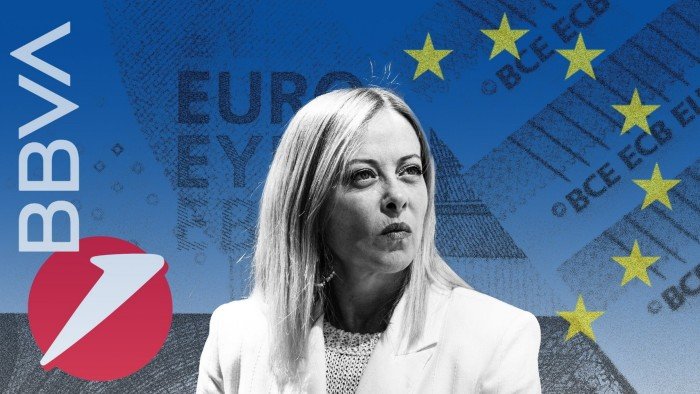EU cracks down on state meddling in bank M&A

Stay informed with free updates
Simply sign up to the European banks myFT Digest — delivered directly to your inbox.
Brussels is ratcheting up pressure on national governments to stop blocking bank consolidation, issuing twin broadsides this week against meddling by the Italian and Spanish governments in banking tie-ups.
Several commission officials told the Financial Times that warnings to Rome and Madrid were connected, as Brussels steps up efforts to encourage banking consolidation and boost the bloc’s ailing economy.
“The problem is that this is pure political posturing and the rules are clear and governments have no formal power to prevent these mergers from happening,” said one senior European official.
“The question here is who are you really competing with . . . our competitors are not inside the EU, they are outside the EU.”
The comments come after the European Commission on Monday sent a private letter to Giorgia Meloni’s government that said it had reached a preliminary conclusion that Rome had “infringed” EU merger laws through its use of golden powers in UniCredit’s €10bn takeover bid for rival Banco BPM.
Three days later, the commission slapped Spain with a “formal notice” over its move to block a merger between BBVA and Banco Sabadell for at least three years, demanding it review its decision and change laws that give Madrid the power to intervene in banking deals.
Brussels views a network of fewer, bigger banks as essential to creating a globally competitive financial sector as Europe’s financial institutions fall further behind their US counterparts, and has grown increasingly frustrated with hostility from national governments.
Europe has to “stop with the philosophy of national champions”, said Enrico Letta, the former Italian premier who wrote a landmark report on EU market integration last year.
“We have to transform these national champions into European champions, having an equal presence in different countries. We need to have the Airbus of banks,” he added.
Europe’s banking sector has experienced a flurry of attempted M&A activity over the past year. However, deals including BBVA’s offer for domestic rival Sabadell, UniCredit’s bid for BPM and its overtures towards Commerzbank in Germany have all met intense domestic political resistance.
The opposition has irritated EU officials and prompted the commission to issue rebukes to both the Spanish and Italian governments in recent weeks.
In its 55-page letter to Rome, the commission went further than a public statement on Monday in which it said Italy’s actions “may contravene” EU merger rules.
Brussels said in the letter that all five conditions imposed on UniCredit’s bid for BPM were incompatible with EU law and handed the Italian government an ultimatum of 20 working days in which to respond. Meloni’s office has said that the government would “answer the clarification requests [in the letter] in a collaborative spirit”.
The commission took particular umbrage with Rome’s argument that the deal may pose a “serious threat to public security”.
“The commission is not aware of any case — nor have the Italian authorities indicated any — of a transaction in the banking sector in the EU that has posed a sufficient and real threat to public security,” the letter said.
It added a demand by Rome that UniCredit exit Russia as a condition of the deal “infringes EU law”.
Meloni’s office said in a statement to the FT that an Italian administrative court had already recognised the legitimacy of the government’s intervention. The prime minister’s office added that the Italian court ruling stated that the government was well within its powers to impose such limitations, including the demand that UniCredit exit Russia, on national security grounds.
The commission did not respond to a request for comment on the letter.
The commission is not yet at the stage where it would take formal action against the German government, as UniCredit has not made a full-blown takeover bid for Commerzbank.
But the Italian lender has already attracted substantial opposition from the German government to its stakebuilding in Commerzbank, where in recent weeks it has started to convert derivative positions to direct equity holdings.
German chancellor Friedrich Merz on Friday said that he would oppose the tie-up unless UniCredit could satisfy him that a combined bank would not pose a significant risk to the financial system.
“It’s an unfriendly approach that we do not accept and do not support,” Merz said. “The resulting institution could, due to its balance sheet structure, pose a significant risk to the financial market. And unless that issue is clearly resolved, I will not change my position.”
https://www.ft.com/__origami/service/image/v2/images/raw/https%3A%2F%2Fd1e00ek4ebabms.cloudfront.net%2Fproduction%2Fa8f0b044-2a9d-4f4a-87df-ec3a0b5902c6.jpg?source=next-article&fit=scale-down&quality=highest&width=700&dpr=1
2025-07-20 04:00:15





